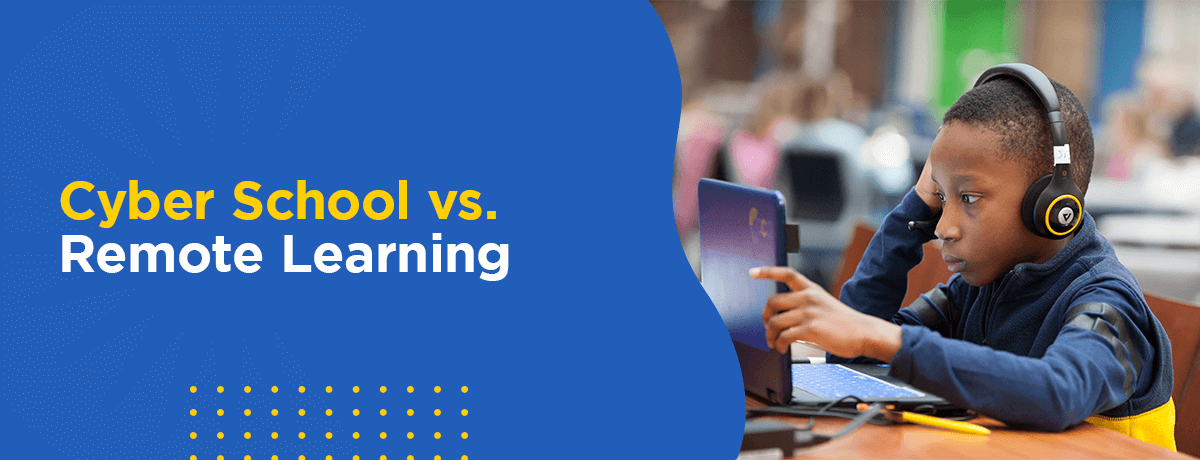Enrollment Now Open for Second Semester. Click Here
Enrollment Now Open for Second Semester. Click Here

In an era when technology is on the rise and many external factors are convincing parents to look for options beyond traditional in-person education, learning via computer is becoming increasingly popular.
However, it can be difficult to understand the intricacies of online education. Many terms get thrown around about online learning, sometimes interchangeably and sometimes with different, nuanced meanings — cyber school, virtual learning, remote classes, online school, and more. This article aims to help clear your understanding of online education opportunities.
Two of the most common forms of online education are cyber schooling and remote learning. In fact, in 2020, the number of students enrolled in Pennsylvania cyber charter schools grew to 60,890 students — a 59% jump from the enrollment numbers in 2019. Similarly, many students had their first experiences with remote learning in 2020, as schools shut down during the COVID-19 pandemic.
Given the popularity of both cyber schooling and remote learning and the many apparent similarities between the two, it can be hard to parse out their differences and decide which form of learning is best for your student.
Cyber school, also called virtual school, is a method of education in which students can take all of their required courses online and at home. Students can earn their diplomas without ever having to enter a traditional brick-and-mortar school. Cyber schools can either be public or private. If public, they are typically cyber charter schools.
Cyber school offers excellent flexibility. Commonwealth Charter Academy (CCA), a public cyber charter school in Pennsylvania, offers flexible scheduling and a customizable curriculum. In traditional schools, students must sit in a classroom for a specific amount of time, all learning the exact same thing. At CCA, students have flexibility in determining their schedules and can personalize their education. CCA is able to provide these benefits because it is a cyber school.
Remote learning, sometimes called distance learning, is essentially traditional schooling done over a computer. While cyber school has specific programs and infrastructures especially designed for online education, remote learning often tries to emulate the physical classroom.
Existing, traditional public and private schools typically offer remote learning as an additional instructional option. Remote learning follows regular class schedules, the only difference being that classes take place in an online video conference tool instead of in an in-person classroom. Similarly, remote learning follows roughly the same curriculum as in-person classes, with the instructor teaching the same broad content to every student.
Though not always the case, some schools only use remote learning when traditional learning isn’t possible. Many students experienced this phenomenon in 2020, when schools shut down because of the pandemic and remote learning became the norm. Some states have also begun allowing public schools to use remote learning in place of shutting down schools for inclement weather. Doing so enables schools to count the remote day as an instructional day rather than losing that day.
Now that we’ve defined cyber schooling and remote learning, it’s time to get into the pros and cons of each to determine which option is best for your child. Cyber schooling, especially through CCA, can be a great educational option. Let’s look at the pros of cyber school:
Compare remote versus virtual learning by first considering the advantages of cyber school:
Keep these factors in mind when it comes to cyber school:
There are many similarities between remote learning and cyber schooling, most notably that they both take place online. Public schools may offer remote learning at no cost, facilitating interaction with fellow students through video conferencing tools. Remote learning may also limit face-to-face interaction and provide opportunities for distraction. However, there are also many differences between remote learning and cyber schooling. Here are the pros and cons specific to remote learning:
The benefits of remote learning include:
Remote learning can come with these drawbacks:
Cyber school and remote learning both take place online, but that’s about where the similarities end. Cyber school offers curricula developed specifically for online learning, with lessons, schedules, activities, and more designed with online, at-home students in mind. Remote learning, on the other hand, is offered by existing brick-and-mortar schools and follows the same rigid format as traditional in-person learning, except that it takes place online.
Both have their pros and cons, but here at CCA, we believe that our cyber schooling programs could be a great choice for your child. Cyber schooling at CCA offers flexible scheduling and a customizable curriculum, both of which work to personalize your student’s education. To learn more about CCA and how it could be a great fit for your child’s education, contact us today.
Enrollment Now Open for Second Semester. Click Here